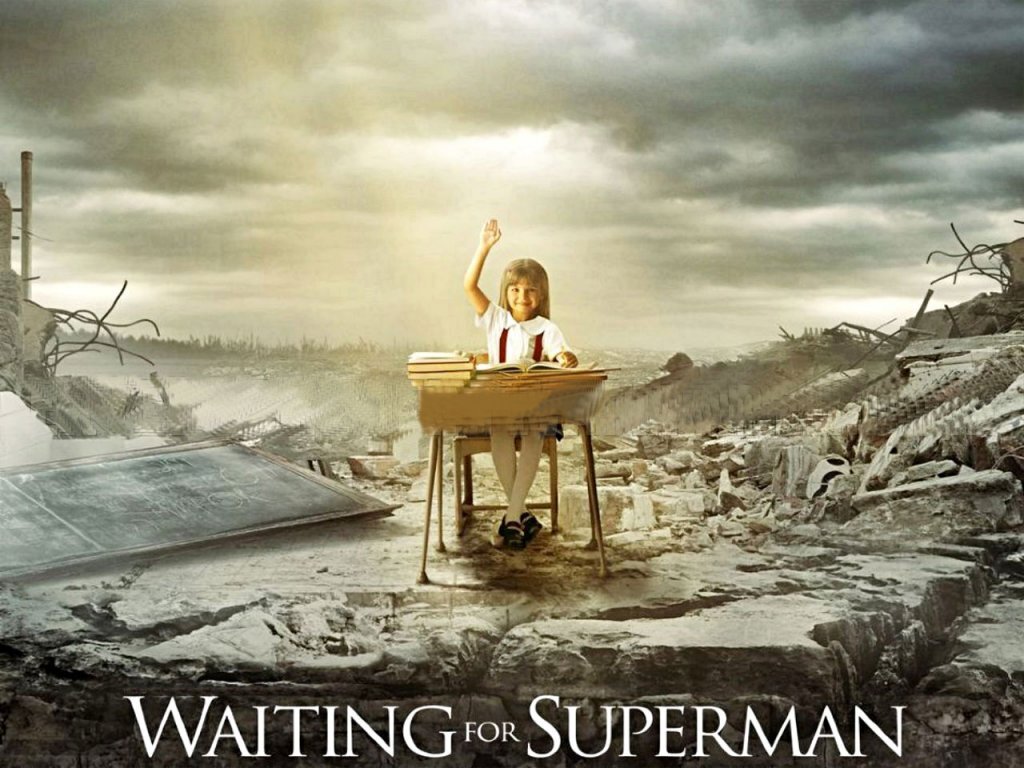Episodes

Tuesday Apr 05, 2011
Well, I guess technically it is a documentary.
Tuesday Apr 05, 2011
Tuesday Apr 05, 2011
"Waiting for Superman"
Part 1- The Film
This is going to be something a little different from a review. I am going to break it into two parts. The first will be a review of the film and the second will my views on one of the most easily fixable problems with education in America. I firmly believe that complaining about a problem without offering a solution makes you part of the problem so I will be offering my insight. But first...

The film "Waiting for Superman" addresses the biggest, most complex, and most important issue facing our country today. It's about education. Specifically, what is wrong with it, and how do we fix it.
In short, the US is falling behind the rest of the world and something must be done. The film hits close to home for me for a number of reasons but mainly because I am a teacher.
This film takes a look at this complex problem and offers a simple solution: charter schools.It is also one of the most irresponsible, slanted, and manipulative pieces of propaganda I have ever seen.
Although, according to this film, I would say that. I am a teacher who is a member of a union, and therefore part of the problem. The film states that because of union contracts, and tenure it is impossible to fire teachers and therefore public schools are fundamentally flawed and irredeemable because schools are saddled with bad teachers and cannot do anything about it.
Now, on some of these points I actually cannot say much. While I am in a union I also live in a right to work state, so my membership is voluntary and almost more ceremonial than anything. Yes, they lobby and negotiate on my behalf but I get that benefit regardless. The only reason I joined is for the legal services. Sadly, we live in such a litigious society that it is wholly possible for parents to sue me if they think their child should have gotten a higher grade. It wouldn't get them anywhere, but it would cost me a lot of money.
I also work in a district that doesn't grant tenure. If a teacher is completely ineffective and the administration is dedicated to high standards that teacher can be removed. This is true even in tenure states. There has to be evidence that a teacher is truly "bad." An administrator can't walk in on a teacher who is just having an off class (it happens) and decide that that person has to go. You see, you actually need to prove that the teacher is bad, which is a bit harder to do than it sounds.
Do you do it base it on a few classroom visits? You would have to do a lot to establish a pattern because even the best teachers have off days. Do you base it on test scores? If so, how? Is it off the median score of your class? That puts AP and teachers who have mostly upper classmen at a distinct advantage. Do you base it on test scores as opposed to other teachers of the same type and grade level? Even then it is possible for one teacher to have a more challenging group of students than another. This is why just firing a teacher is difficult.
But, I will concede this point: There are bad teachers, and those teachers are "impossible" to fire. Fine. Even if this is the case, using the film's own data, we are talking about 5-10% of teachers. In my mind this number is unacceptably high, but let’s think about it in other terms. If you look in any profession you will find at least this many people who are horrible at it. There are bad lawyers who are responsible for innocent people going to jail, there are bad doctors who cause great harm and loss of life to people, there are even bad drivers who kill and ruin lives. Do we give up on the justice system or hospitals or driving because of it? No, we don't. Basically, this is not a simple problem with a simple solution. This is a very complex problem and anyone who says there is a simple, cut and dried solution is probably selling something.
To condemn the 90% because of the 10% is a disservice to everyone involved. But I know what you're thinking; you only care if your kid gets one of those 10%.That is where you come into play. If you are active in your child's education you will know this. I am brought to mind my 9th grade algebra teacher who responded to my mother’s request for an after school meeting with "I don't meet with parents outside of school hours. If you need to see me I have a conference period during the day." Just so you know, were I to try that at my school I would have a "clarification session" with my principal and call that parent to schedule a meeting at their his or her convenience. My mother's solution to this was near daily contact to ensure my progress. This brings up a point I will go into detail on later.
Early on, this film puts forth an opinion which is then treated as a fact and provides the basis for all of what follows. The problem isn't bad neighborhoods that create bad schools, but rather bad schools that make the neighborhoods bad. This is one of the most foolish statements I have ever heard. But, for arguments sake, we'll go with it.
So, let's take a look at the film’s solution. Charter schools are public schools that operate outside the regular school system, and according to this film they are dreamlike oases of learning where even the most disadvantaged students flourish with absolutely no problems.
First off, I want to take my hat off and applaud the people behind these schools as much as humanly possible. They do more honor to my profession than I can ever fully express and I am grateful they are there. However, the model for these schools is impossible to implement on a large scale and sustain, and it isn't any more effective than public schooling. I am not opposed to charter schools, quite the opposite, in fact. I am strongly in favor of anything that provides quality educational opportunities to children. However, I feel that it is of paramount importance to ensure that those opportunities, whatever they may be, work.
This is where I fond my real problem with this film.
The only people the film makers talk to are either running very successful charter schools, or ... well, they do talk to the chancellor of the Washington DC public school system and... um... I guess that's it.
So, they set out to make a "documentary" about the problems with public education and the virtues of charter schools and they go about it by showing only one side of the story, briefly brushing over the successes of public schooling and highlighting the absolute best of the best in charter schools. That information is then dressed up in a slick package and presented as gospel. But, back to charter schools. These are schools that, in many cases, have fewer students enrolled than I have in my classes.
Let me clarify. I have a student roster of around 150. Some of these schools have an entire population of 100.
Much smaller classes, more one-on-one time, and a student body comprised entirely of students with parents who have to specifically apply for them to go there (again, more on this last part later).
These schools have limited space, and since they are public they have to hold completely random lotteries to decide which of the applicants will be accepted. Let me give you a numbers breakdown directly from this film.
APPLICANTS ACCEPTED % ACCEPTED
455 100 21%
135 10 7%
792 40 5%
767 35 4%
27,462 2,175 7.9%
The last number may seem a bit off, and I will admit that I cheated on that one. It's not from the film. It's Harvard. That's right, THE Harvard. Let me put this in perspective: Harvard University has an acceptance rate of less than 8%. 3 of these 4 schools are harder to get into than Harvard. If your school only accepts 4% of applicants (half that of Harvard) you had damned well better guarantee academic success.
Let's put that number aside and get to what I think is the truly important factor, and the topic I've been promising to address. All of these children are lucky enough to have parents who want them to get an education so badly that they are willing to go to extreme measures to ensure they get the best opportunities available.
In my experience there is no greater predictor of academic success than parental involvement. It doesn't guarantee it, and there are many kids who succeed without it, but it is a good predictor.
Yes, there are other indicators, and many of these kids have things going on in their private lives that I couldn't even handle and that is something this film completely overlooks. For as much as you hear about "at risk" youth there is a large percentage of these children who aren't at risk, they are already damaged. They are kids who are damaged by forces beyond their control and to ignore this is to fundamentally disrespect their life experiences.
They show you a low performing school and present it as the reason for all of these problems. But there isn't any mention of a culture that makes being smart “un-cool” (which is universal among teenagers), or unstable home lives, or teenagers who are responsible for taking care of younger siblings or their own children. These are problems that transcend race, ethnic, and socio-economics. Kids today are dealing with a world that makes it much harder to be young and innocent it was for any of us and that does spill over into education.
They speak about "no excuses" and having "high standards," but completely leave out what happens when a child fails to meet these standards repeatedly. That's the thing about charter schools. You have to apply and be accepted, even if there are no up front academic requirements, and if you fail to meet the standard you can be removed. The numbers are inherently slanted because you are dealing with thousands who have to as opposed to hundreds who choose to. This isn't an excuse, its a reality. And that reality makes the issue infinitely more complex.
This is a well meaning documentary that completely misses the point. It holds up the worst case scenario as a condemnation of public schools while using a best case scenario to show the virtues of charters.
Here's the truth about charter schools. The data that is out there, and there is a lot, shows them to be almost identical to public schools. Some are amazing, some are awful, and most are no better or worse than their "public" counterparts. But even in looking at reports, articles, and studies it is impossible to get a clear picture of the success of these schools because so many of the pieces out there are written by people who strongly support charters that even critical pieces end up being spun in favor of the schools. Only in looking at a large sample of data from a diversity of sources will you even begin to be able to put together the truth about these schools. I would quote studies, but I have seen too many to narrow it down and would ultimate be fruitless because for every article that praises there is one condemning, and for every critical one there is a laudatory one. You're an adult, the information is out there and you should look it up for yourself rather than taking my word for it (that's me teaching you how to fish, rather than giving you a fish.).
This is a manipulative film that uses skewed scientific data and emotional footage of struggling kids to advance an agenda. Well, two can play at that game.
I went to private catholic schools until the second grade. During that time I was relegated to the "very slow" group of students, a group which consisted of just me. Why? Because they ignored my very severe, and very apparent, learning disability and pushed me aside because it was too difficult to teach me. Had my mother not been insistent and gone outside of the school she never would have seen that I was not being taught (the teacher stopped correcting my math work and allowed me to make up my own way of doing it). Had I stayed in that school college, well let's be honest, college was off the table for me in first grade.
Then my father, who was in the Air Force, was transferred to a base in Panama where I met the amazing educator who changed my life forever (thank you again Wanda). Had it not been for this public school teacher my educational career would have died before it began. As it stands I hold a Bachelor of Science and a Bachelor of Arts from the University of Texas at Austin. I have had success in several different professional fields and am now nearing the end of my 5th very successful year as a teacher. All thanks to a public school teacher.
Anecdotal and unscientific, yes. But my example is exactly as scientific and reliable as what you'll see in "Waiting for Superman."
My real problem with this film has nothing to do with it's assault on my profession. It gives a false answer to a vitally important question and, in doing so, takes time, attention, and resources away from finding a real solution, and that is unforgivable.
At the end of the film, the mother of one of the kids who didn't get accepted to a charter school makes one of the most touching and powerful statements I've ever heard on film. "I will never give up on my kids." As a public school teacher I want to assure her that we won't either.


No comments yet. Be the first to say something!